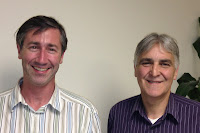UMass
Memorial management is considering contracting out Biomed Engineering (also
known as Clinical Engineering) to save the hospital money. If the hospital
decides to accept the outsourcing bid, an outside company would take over the
maintenance of UMass Memorial Healthcare machines and devices.
 The
SHARE Biomed Technicians are quite concerned, as you can imagine. If their work
is contracted out, some of them might be offered jobs by the outside company
and continue to work here at UMass Memorial, but that would be up to the new company. We don't know what the wages or benefits might be. We
have been told that the outside vendor would have fewer technicians permanently located
on site, and use floats as needed. A number of the Biomed Techs are within a
few years of retirement, and are concerned that the new company might not want to hire
them.
The
SHARE Biomed Technicians are quite concerned, as you can imagine. If their work
is contracted out, some of them might be offered jobs by the outside company
and continue to work here at UMass Memorial, but that would be up to the new company. We don't know what the wages or benefits might be. We
have been told that the outside vendor would have fewer technicians permanently located
on site, and use floats as needed. A number of the Biomed Techs are within a
few years of retirement, and are concerned that the new company might not want to hire
them. The SHARE Biomed Technicians are also quite worried about the quality of work that a third party company would deliver at UMass Memorial. Some of them have worked for third party companies before, and know that the level of commitment to the patients, to the hospital, and to the community is just not the same. Many of them have chosen to work at UMass Memorial because Clinical Engineering here is an in-house operation where they can do their best quality work. Others have seen Clinical Engineering departments elsewhere be contracted out, only to be brought back in-house within a few years because the hospitals’ control over quality was lower and the costs ended up being higher with the third party vendor.
Trying to Keep the Jobs In-House
SHARE
proposed to UMass Memorial that we explore alternatives together before
deciding whether to contract out Clinical Engineering. SHARE believes that front-line employees can be deeply
involved in solving problems: They are experienced and knowledgeable about the
work, and committed to quality patient care and to their hospitals. We believe
that if SHARE members and Clinical Engineering managers engage in process
improvement together – analyzing the data and the contracts, studying the work
flow in a deliberate and thorough way – we may be able to find enough savings
to keep the work in-house.
UMass
Memorial agreed to give the Biomed Technicians and SHARE the time and the data needed to work on an alternative that saves the hospital
money while continuing to provide high quality services. Five SHARE Biomed
Techs and several SHARE organizers are
meeting with managers from Clinical Engineering and Human Resources to look at how to make their work more efficient and how to use that time to do work that saves the hospital money. Soon the SHARE team will present their proposal. Stay tuned.
A New Direction for the Future
A New Direction for the Future
Working
together to prevent outsourcing is a positive new challenge for SHARE and UMass
Memorial. If we can figure out how to do this work together, many more SHARE
employees can have a say about solving problems in their work areas, and UMass
Memorial will be better able to deal with all the changes we face in healthcare
today and tomorrow.
Please Take Our Survey
Please Take Our Survey
The
Biomed Techs and SHARE organizers would like to hear from anyone at UMass
Memorial who has thoughts – ideas or concerns – about this. We welcome all
ideas, and would very much like to involve end-users in the conversation.
Please take a few minutes to fill out our survey at:

